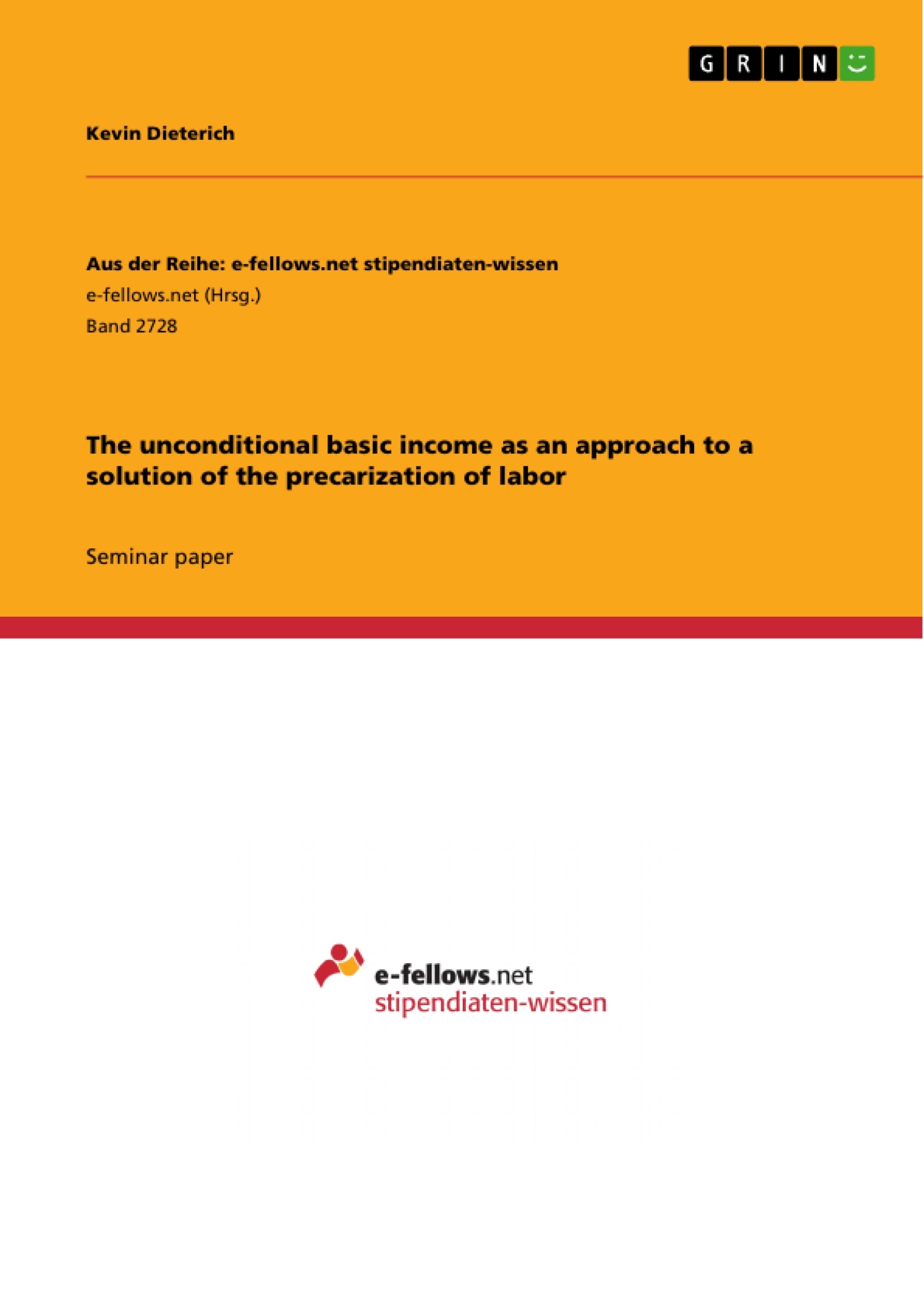I will address the emerging problem of precarious working conditions in Germany as a result of neoliberal capitalism. I will then introduce the concept of an unconditional basic income, before taking up the debate if a basic income could counteract the factors that lead to precarity by analyzing and comparing the statements of sociologists and representations of interests in that field. Finally, this paper will conclude by evaluating the aforementioned explanations and suggesting alternative approaches to the topical problem.
Inhaltsverzeichnis (Table of Contents)
- 1. Introduction
- 2. The dangerous drift towards precarious working conditions
- 3. The idea of an unconditional basic income
- 4. The unconditional basic income debate
- 4.1. The unconditional basic income as an approach to fight precarity
- 4.2. Criticism of basic income models
- 5. Concluding reflections and alternative approaches
Zielsetzung und Themenschwerpunkte (Objectives and Key Themes)
This paper examines the increasing precarization of labor in Germany, a consequence of neoliberal economic policies. It explores the potential of an unconditional basic income (UBI) as a solution to mitigate this issue. The paper analyzes arguments for and against UBI, drawing on sociological research and policy debates.
- Precarization of Labor in Germany
- The Unconditional Basic Income (UBI) as a Policy Solution
- Arguments for and Against UBI
- Analysis of UBI Models
- Alternative Approaches to Combating Precarity
Zusammenfassung der Kapitel (Chapter Summaries)
1. Introduction: This introductory chapter sets the stage by highlighting the paradox of increasing productivity alongside job insecurity in the context of digitalization and technological advancements. It argues that the decoupling of production from human labor necessitates a rethinking of employment and income allocation systems, leading to the central focus of the paper: the unconditional basic income as a potential solution to the growing precarity of labor relations. The chapter establishes the core problem and outlines the paper's structure.
2. The dangerous drift towards precarious working conditions: This chapter details the growing prevalence of precarious employment in Germany, a consequence of neoliberal policies prioritizing market deregulation and labor market flexibility. It explores the characteristics of precarious work, including job insecurity, low pay, and the lack of social and economic stability. The chapter emphasizes the impact of precarity on various groups, particularly migrants and women in the service sector, highlighting the social and psychological consequences of these insecure work arrangements. It also defines the key elements of precarity, referencing the work of Guy Standing and the ILO, and discusses the lack of long-term security, work-life balance, and community within precarious employment.
3. The idea of an unconditional basic income: This chapter introduces the concept of an unconditional basic income (UBI) as a potential solution to the problems highlighted in the previous chapter. It discusses the core characteristics of UBI—individual entitlement, no means testing, and unconditionality—and explains how it aims to reform the existing economic and social inequalities generated by precarity. The chapter explores different models of UBI implementation, focusing on the proposals of Götz Werner and Dieter Althaus as examples of prominent approaches in the German context. It also notes the broad range of political support for UBI, both in Germany and globally.
Schlüsselwörter (Keywords)
Precarious employment, Unconditional Basic Income (UBI), Neoliberalism, Labor market flexibility, Job insecurity, Social security, Income inequality, Götz Werner, Dieter Althaus, Precarity, Digitalization, Technological unemployment.
Frequently Asked Questions: Analysis of Precarious Employment and Unconditional Basic Income in Germany
What is the main topic of this paper?
This paper examines the increasing precarization of labor in Germany due to neoliberal economic policies and explores the potential of an unconditional basic income (UBI) as a solution. It analyzes arguments for and against UBI, drawing on sociological research and policy debates.
What are the key themes discussed in the paper?
Key themes include the precarization of labor in Germany, the unconditional basic income (UBI) as a policy solution, arguments for and against UBI, analysis of UBI models, and alternative approaches to combating precarity. The paper also delves into the impact of digitalization and technological advancements on employment and income allocation.
What are the chapter summaries?
Chapter 1 (Introduction): Introduces the paradox of increasing productivity alongside job insecurity and frames UBI as a potential solution. Chapter 2 (Precarious Working Conditions): Details the growing prevalence of precarious employment in Germany, its characteristics, and its impact on various groups. Chapter 3 (The Idea of UBI): Introduces the concept of UBI, its characteristics, different models, and examples from the German context. Chapter 5 (Concluding Reflections): Offers concluding thoughts and explores alternative approaches.
What are the arguments for and against UBI discussed in the paper?
The paper analyzes arguments both in favor of and against UBI as a means to address the issue of precarious employment. Specific details on the arguments are not provided in this preview.
What are some examples of UBI models discussed?
The paper mentions the proposals of Götz Werner and Dieter Althaus as examples of prominent UBI approaches in the German context, although details of these models are not provided in the preview.
What is the definition of precarious employment as used in this paper?
The paper defines precarious employment as characterized by job insecurity, low pay, and the lack of social and economic stability, impacting work-life balance and community. It references the work of Guy Standing and the ILO in its definition.
What is the relationship between digitalization and precarious employment, according to the paper?
The paper suggests a link between increasing productivity through digitalization and technological advancements and the rise of job insecurity, arguing that this decoupling necessitates a rethinking of employment and income allocation systems.
What are the key words associated with this paper?
Key words include: Precarious employment, Unconditional Basic Income (UBI), Neoliberalism, Labor market flexibility, Job insecurity, Social security, Income inequality, Götz Werner, Dieter Althaus, Precarity, Digitalization, Technological unemployment.
- Citar trabajo
- Kevin Dieterich (Autor), 2016, The unconditional basic income as an approach to a solution of the precarization of labor, Múnich, GRIN Verlag, https://www.grin.com/document/418380



